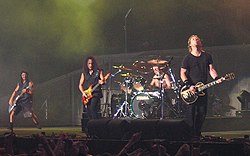Arena rock is a style of rock music that originated in the mid-1970s. As hard rock bands and those playing a softer yet strident kind of pop rock became increasingly popular, groups began creating material inherently designed for performance to large audiences, and arena rock developed from their use of more commercially oriented and radio-friendly sounds. The often highly produced music, including both upbeat, dramatic songs and slower power ballads, features strong emphasis on melody and frequently employs anthemic choruses. Other major characteristics include prominent guitar effects and the use of keyboard instruments.

A concert is a live music performance in front of an audience. The performance may be by a single musician, sometimes then called a recital, or by a musical ensemble, such as an orchestra, choir, or band. Concerts are held in a wide variety and size of settings, from private houses and small nightclubs, dedicated concert halls, amphitheatres and parks, to large multipurpose buildings, such as arenas and stadiums. Indoor concerts held in the largest venues are sometimes called arena concerts or amphitheatre concerts. Informal names for a concert include show and gig.

An instrument amplifier is an electronic device that converts the often barely audible or purely electronic signal of a musical instrument into a larger electronic signal to feed to a loudspeaker. An instrument amplifier is used with musical instruments such as an electric guitar, an electric bass, electric organ, electric piano, synthesizers and drum machine to convert the signal from the pickup or other sound source into an electronic signal that has enough power, due to being routed through a power amplifier, capable of driving one or more loudspeaker that can be heard by the performers and audience.

Wacken Open Air is a heavy metal music festival, held annually since 1989 on the first weekend of August in the village of Wacken in Schleswig-Holstein, Germany. Almost all styles and subgenres of hard rock and metal are represented and hosted. It is now one of the largest heavy metal festivals in the world and one of the largest open-air festivals in Germany. Between 2011–2018, the number of attendees was around 85,000, 75,000 of whom were paying visitors. Due to the COVID-19 pandemic, there were no 2020 and 2021 editions of Wacken Open Air.

A rhythm section is a group of musicians within a music ensemble or band that provides the underlying rhythm, harmony and pulse of the accompaniment, providing a rhythmic and harmonic reference and "beat" for the rest of the band. The rhythm section is often contrasted with the roles of other musicians in the band, such as the lead guitarist or lead vocals whose primary job is to carry the melody.
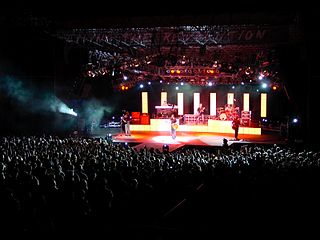
A sound reinforcement system is the combination of microphones, signal processors, amplifiers, and loudspeakers in enclosures all controlled by a mixing console that makes live or pre-recorded sounds louder and may also distribute those sounds to a larger or more distant audience. In many situations, a sound reinforcement system is also used to enhance or alter the sound of the sources on the stage, typically by using electronic effects, such as reverb, as opposed to simply amplifying the sources unaltered.

An earplug is a device that is inserted in the ear canal to protect the user's ears from loud noises, intrusion of water, foreign bodies, dust or excessive wind. Since they reduce the sound volume, earplugs may prevent hearing loss and tinnitus, in some causes.
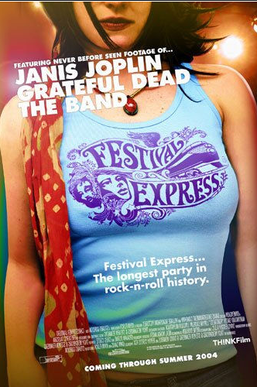
Festival Express is a 2003 British documentary film about the 1970 train tour of the same name across Canada taken by some of North America's most popular rock bands, including Grateful Dead, Janis Joplin, The Band, Buddy Guy, Flying Burrito Bros, Ian & Sylvia's Great Speckled Bird, Mountain and Delaney & Bonnie & Friends. The film combines footage of the 1970 concerts and on the train, interspersed with contemporary recollections of the tour by its participants.
The Music of North Dakota has followed general American trends over much of its history, beginning with ragtime and folk music, moving into big band and jazz. With the development of mass media, local artists in North Dakota, as in the rest of the country, saw a rapid loss of opportunity to create, perform, and sell popular music to the regional audience that had previously provided a market. Punk Music is a major genre in the modern youth scene of North Dakota.

The Grand Olympic Auditorium is a former sports venue in southern Downtown Los Angeles, California. The venue was built in 1924 at 1801 South Grand Avenue, now just south of the Santa Monica Freeway. The grand opening of the Olympic Auditorium was on August 5, 1925, and was a major media event, attended by such celebrities as Jack Dempsey and Rudolph Valentino. One of the last major boxing and wrestling arenas still in existence, the venue now serves as a worship space for the Korean-American evangelical church, "Glory Church of Jesus Christ".

The Powder Ridge Rock Festival was scheduled to be held July 31, August 1 and August 2, 1970 at Powder Ridge Ski Area in Middlefield, Connecticut. A legal injunction forced the event to be canceled, keeping the musicians away; but a crowd of 30,000 attendees arrived anyway, to find no food, no entertainment, no adequate plumbing, and at least seventy drug dealers. William Manchester wrote: "Powder Ridge was an accident waiting to happen, and it happened." Volunteer doctor William Abruzzi declared a drug "crisis" on August 1, saying "Woodstock was a pale pot scene. This is a heavy hallucinogens scene."

A music venue is any location used for a concert or musical performance. Music venues range in size and location, from a small coffeehouse for folk music shows, an outdoor bandshell or bandstand or a concert hall to an indoor sports stadium. Typically, different types of venues host different genres of music. Opera houses, bandshells, and concert halls host classical music performances, whereas public houses ("pubs"), nightclubs, and discothèques offer music in contemporary genres, such as rock, dance, country, and pop.

A diesel generator (DG) (also known as a diesel genset) is the combination of a diesel engine with an electric generator (often an alternator) to generate electrical energy. This is a specific case of engine generator. A diesel compression-ignition engine is usually designed to run on diesel fuel, but some types are adapted for other liquid fuels or natural gas.

The Rolling Stones' Steel Wheels Tour was a concert tour which was launched in North America in August 1989 to promote the band's album Steel Wheels; it continued to Japan in February 1990, with ten shows at the Tokyo Dome. The European leg of the tour, which featured a different stage and logo, was called the Urban Jungle Tour; it ran from May to August 1990. These would be the last live concerts for the band with original member Bill Wyman on bass guitar. This tour would also be the longest the band had ever done up to that point, playing over twice as many shows as their standard tour length from the 1960s and 1970s.
In theater, dance, and live musical performances, a rider is a set of requests or demands that a performer sets as criteria for performance, which are typically fulfilled by the hosting venue. Types of riders include hospitality and technical.

The music of Cardiff has been dominated mainly by rock music since the early 1990s with later trends developing towards more extreme styles of the genre such as heavy metal and metalcore music. It, along with the nearby music scene in Newport, has brought a number of musicians to perform or begin their careers in South Wales.
The Dig Out Your Soul Tour was the final concert tour by English rock band Oasis, in support of their album Dig Out Your Soul. The tour started in Seattle, Washington at the WaMu Theater on 26 August 2008 and was planned to continue until 30 August 2009, where they were scheduled to play their final show of the tour at the I-Day Festival in Milan, Italy. However, on 28 August 2009, after a fight between the Gallaghers in the backstage, their manager announced the cancellation of their concert at the Rock-en-Seine festival near Paris just minutes before it was about to begin, the cancellation of the European tour and that the group "does not exist anymore", referring a coming statement from Noel Gallagher.
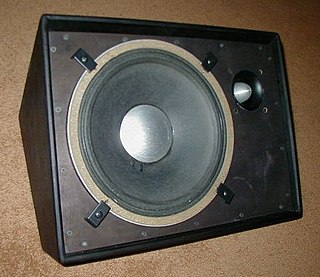
A stage monitor system is a set of performer-facing loudspeakers called monitor speakers, stage monitors, floor monitors, wedges, or foldbacks on stage during live music performances in which a sound reinforcement system is used to amplify a performance for the audience. The monitor system allows musicians to hear themselves and fellow band members clearly.
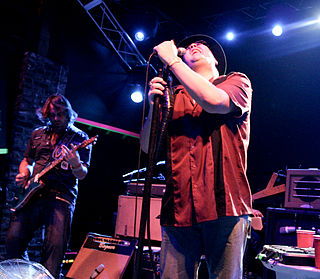
A jam band is a musical group whose concerts and live albums substantially feature improvisational "jamming." Typically, jam bands will play variations of pre-existing songs, extending them to improvise over chord patterns or rhythmic grooves. Jam bands are known for having a very fluid structure, playing long sets of music which often cross genre boundaries, varying their nightly setlists, and segueing from one song into another without a break.

Peter Shapiro is an American club owner, concert promoter, filmmaker, magazine publisher, author and entrepreneur from New York City. He is widely known as the promoter for Fare Thee Well: Celebrating 50 Years of the Grateful Dead, the Grateful Dead's 50th anniversary "final shows". Shapiro first gained renown through two films that screened at the Sundance Film Festival: Tie-Died: Rock 'n Roll's Most Deadicated Fans (1995) and American Road (1997). He has gone on to produce numerous other projects including U2 3D (2007) and All Access: Front Row. Backstage. Live! (2001). The Producers Guild of America identified him as one of “The Digital 25: Visionaries, Innovators and Producers of 2009.” On June 8, 2016, Shapiro was honored at the annual gala of the BRIC Celebrate Brooklyn! Festival.

